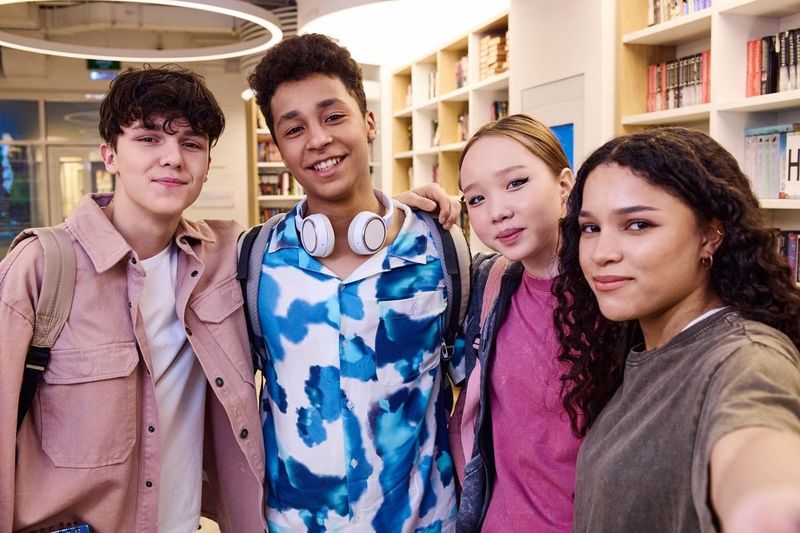Generation Alpha, born from the early 2010s to the mid-2020s, is growing up in a world vastly different from its predecessors. Defined by technology, social media, and rapid cultural shifts, their formative years are marked by unique challenges and opportunities.
This generation navigates their awkward phase under public scrutiny, unlike any generation before them.
1. They’re Growing Up on Camera
Imagine growing up with a camera constantly in your face. For Gen Alpha, this is reality. From the first steps captured on video to daily vlogs of family life, every moment is recorded and shared. This constant surveillance can create pressure to perform, even in the most mundane situations. While some kids become natural performers, others may feel trapped by this visibility, experiencing anxiety over constant scrutiny.
Despite the challenges, this unprecedented documentation offers a rich tapestry of memories. Parents and children have an extensive archive of moments to look back on, celebrating the highs and lows of their early years.
But living life on camera also means navigating privacy concerns, shaping their understanding of what’s personal and what’s public.
Ver também: 16 Gen Z and Millennial Trends That Make Boomers and Gen X Roll Their Eyes
2. Filters Shape Their Self-Esteem
For Gen Alpha, filters are not just playful enhancements but vital tools that shape self-esteem. These digital masks can alter reality, offering a curated version of oneself to the world. With every tweak, kids can become someone else entirely—blemishes vanish, features are exaggerated, and insecurities masked.
This digital camouflage, while fun, can distort self-image. Children may start believing that filtered beauty is the norm. The quest for perfection becomes a daily struggle, influencing how they perceive themselves and others.
Yet, there’s an upside. Filters can also empower creativity, allowing kids to explore identities and express themselves artistically. They learn to accept and celebrate their unfiltered selves, balancing illusion and reality.
3. They’re Hyper-Aware of What’s “Cringe”
Among Gen Alpha, the fear of being labeled “cringe” is real. In a digital world where trends change swiftly, staying relevant is a full-time job. The looming threat of online ridicule keeps them vigilant, constantly evaluating what’s considered cool or embarrassing.
This hyper-awareness can stunt genuine expression. Kids may hold back their true selves, fearing perceptions of peers. But it also fosters a savvy understanding of social dynamics, teaching them to adapt quickly.
Ultimately, this awareness can be empowering. By navigating what’s cringe-worthy, Gen Alpha is developing a keen sense of self and social intelligence. They’re learning to balance authenticity with social norms, a skill that will serve them well throughout life.
4. School Social Rules Change Every Month
In Gen Alpha’s world, school social rules are in constant flux. One month brings a new trend, the next, a different way to interact. From handshake styles to slang words, the landscape is ever-changing, driven by viral challenges and memes.
This dynamic environment fosters adaptability. Kids learn to read social cues and adapt quickly, becoming proficient in understanding complex social hierarchies. However, this constant change can be exhausting, leaving some children feeling left behind or confused.
Nevertheless, these experiences cultivate resilience. By navigating shifting norms, Gen Alpha gains valuable skills in flexibility and innovation, preparing them for the unpredictable realities of modern life.
5. They Watch Themselves More Than Others Watch Them
Gen Alpha is often more concerned with self-observation than external scrutiny. With smartphones in hand, they document their lives constantly, analyzing their own behavior and appearance. This self-focus can foster self-awareness, as they notice details others might miss.
However, this introspection can lead to self-consciousness, creating pressure to meet personal expectations. The habit of self-watching can also limit interaction with the outside world, narrowing their focus to personal achievements.
Yet, this inward gaze is not without merit. It encourages self-reflection, prompting questions about identity and purpose. As they grow, Gen Alpha learns to balance self-observation with engagement, finding confidence in their evolving self-image.
6. They Know More, So They Question More
With access to endless information, Gen Alpha is more inquisitive than ever. They question everything, from the mundane to the profound. This curiosity fuels their growth, encouraging exploration beyond traditional boundaries.
However, this abundance of knowledge can overwhelm. The constant influx of information sometimes leads to confusion, as they struggle to discern credible sources from unreliable ones. Despite this, their inquisitive nature drives them to seek answers, cultivating critical thinking skills.
This insatiable curiosity equips them to challenge norms, pushing for innovation and change. As they navigate this complex world, Gen Alpha’s questions pave the way for a future defined by curiosity and discovery.
7. Memes Have Replaced Inside Jokes
For Gen Alpha, memes are the new inside jokes. These digital snippets of humor transcend traditional boundaries, uniting kids across the globe with shared laughter. Memes provide instant connection, eliminating barriers of language and culture.
While this universal humor fosters a sense of belonging, it also shifts how friendships form. The intimacy of inside jokes is replaced by shared online experiences, altering personal connections. Despite this, memes offer a new form of expression, allowing creativity and wit to flourish.
As they navigate this meme-centric world, Gen Alpha learns to appreciate humor’s evolving landscape. They find joy in the absurd and the relatable, cultivating bonds in the digital age.
8. Every Outfit Can Be a Statement—Or a Target
Fashion for Gen Alpha is more than just clothing; it’s a means of expression. Each outfit becomes a statement, reflecting individuality and creativity. However, this sartorial freedom comes with challenges. In a world where appearances are constantly judged, clothing can also make them a target for criticism.
Navigating fashion’s complex landscape teaches resilience. Kids learn to own their choices, developing confidence in their unique style. Yet, the pressure to conform can be overwhelming, leading some to question their self-worth based on appearance.
Despite these hurdles, fashion becomes a powerful tool for self-discovery. Gen Alpha uses clothing to explore identity, finding empowerment through personal expression. They learn to balance societal expectations with their desire to stand out.
9. Digital Fandoms Shape Their Identity
Gen Alpha’s identity is often defined by digital fandoms. From YouTube stars to gaming communities, these online worlds provide a sense of belonging. Kids immerse themselves in these hobbies, finding like-minded peers and role models who understand their passions.
However, this digital devotion can blur lines between reality and fantasy. The intense focus on online personas sometimes overshadows real-world interactions, affecting social skills. Despite this, fandoms offer a sanctuary where creativity thrives. Kids develop unique talents, inspired by their idols.
This digital landscape fosters loyalty and community, teaching Gen Alpha to appreciate diverse perspectives. As they navigate these virtual worlds, their identities are shaped by shared enthusiasm and collaborative spirit.
10. Their Role Models Are Often Teen Influencers
Teen influencers hold undeniable sway over Gen Alpha. Their lives, documented online, provide a window into possibilities and aspirations. These young role models offer relatable advice, shaping how kids perceive success and fulfillment.
However, this influence is double-edged. The curated perfection seen in influencers’ lives can create unrealistic expectations, leading to dissatisfaction with one’s circumstances. Despite this, positive influences abound. Many teen influencers advocate for social causes, inspiring activism and awareness.
As Gen Alpha engages with these digital mentors, they learn to discern authenticity from facade. They seek role models who resonate with their values, navigating influencer culture with a critical eye and an open heart.
11. Trends Move Faster Than Their Confidence
In Gen Alpha’s world, trends shift at lightning speed. From viral challenges to fleeting fads, keeping up is a daunting task. This relentless pace can leave kids feeling like they’re perpetually playing catch-up, impacting their confidence.
Despite this, the fast-paced environment encourages adaptability. Kids learn to pivot quickly, embracing change as a constant. However, the pressure to conform can overshadow personal growth, leading some to question their self-worth.
Yet, there’s value in this whirlwind. Gen Alpha develops resilience, learning to navigate the ebb and flow of trends. They discover that true confidence lies in authenticity, not in relentless pursuit of fleeting fads.
12. They’re More Emotionally Fluent But Less Resilient
Gen Alpha is remarkably emotionally fluent. Growing up with discussions about feelings and mental health, they navigate emotional landscapes with ease. This awareness fosters empathy, allowing them to connect deeply with others.
However, this emotional intelligence doesn’t always translate to resilience. Shielded from life’s harsh realities, some kids struggle to cope with adversity. This lack of resilience can make setbacks more challenging to overcome.
Yet, emotional fluency is a powerful tool. It equips Gen Alpha to communicate effectively, building meaningful relationships. As they mature, they learn to balance emotional insight with resilience, finding strength in vulnerability and growth in challenge.
Ver também: 15 Things Gen Z Thinks Are Beneath Them
13. Comparison Starts Before Recess
For Gen Alpha, comparison starts young. In a hyper-connected world, kids are acutely aware of what others have, from gadgets to experiences. This early awareness can lead to competition, even before the school bell rings.
While this can drive ambition, it also creates pressure. Children may feel inadequate if they don’t measure up to peers, impacting self-esteem. However, these experiences teach valuable lessons in self-worth and acceptance.
Despite the challenges, comparison fosters growth. Gen Alpha learns to appreciate diversity, understanding that worth isn’t defined by possessions. They discover that personal achievements hold meaning beyond societal benchmarks, cultivating confidence in their unique journey.
14. Screens Blur Real-World Social Cues
In Gen Alpha’s digital realm, screens dominate. While these portals offer connection, they can obscure real-world social cues. Kids often miss subtle expressions and gestures, affecting their ability to interpret emotions.
This reliance on technology can hinder social skills, creating challenges in face-to-face interactions. However, it also presents opportunities for growth. Kids learn to bridge digital and real-world communication, developing hybrid social fluency.
As they balance screen time with personal interaction, Gen Alpha gains insight into the nuances of human connection. They learn to value empathy and understanding, enhancing their social intelligence for a digital future.
15. They’re Asked to Be “Woke” Before They’re Ready
Gen Alpha is thrust into a world demanding awareness from an early age. Social justice, climate change, and equality are topics they encounter before fully comprehending them. This expectation to be “woke” can be overwhelming, creating pressure to understand complex issues prematurely.
While these challenges foster awareness, they can also lead to confusion and anxiety. Kids may struggle to balance activism with childhood innocence. Despite this, early exposure ignites curiosity, inspiring informed global citizens.
As they navigate these complexities, Gen Alpha learns to engage thoughtfully with the world. They develop critical thinking skills, balancing activism with age-appropriate understanding, preparing for a future where awareness is key.
16. Group Chats Can Turn Toxic Overnight
For Gen Alpha, group chats are a social lifeline. These digital conversations offer connection beyond physical boundaries. However, the rapid nature of communication can turn toxic overnight, with misunderstandings escalating quickly.
Navigating these digital waters teaches conflict resolution skills. Kids learn to manage disagreements, developing strategies to maintain harmony. However, the emotional toll can be significant, affecting mental well-being.
Despite these challenges, group chats offer a platform for meaningful connection. Gen Alpha learns to navigate digital drama with resilience, finding support in virtual friendships. They discover the value of empathy and communication, essential skills for thriving in a connected world.
17. Their Awkwardness Is Often Broadcast, Not Hidden
Gen Alpha lives in a world where awkward moments are often broadcast, not hidden. Social media captures and shares everything, making embarrassing incidents public. This visibility can amplify feelings of self-consciousness, as kids navigate their awkward phase under a spotlight.
Despite this, it fosters resilience. Kids learn to laugh at themselves, developing a sense of humor about imperfections. They discover that vulnerability is a shared experience, building connections through candid moments.
As they embrace their awkwardness, Gen Alpha learns that authenticity is powerful. They find confidence in imperfection, realizing that everyone experiences awkward phases. This acceptance empowers them to navigate their formative years with grace and humor.
Ver também: 16 Things Boomers Find Absurd About the Way Gen Z Was Raised


















